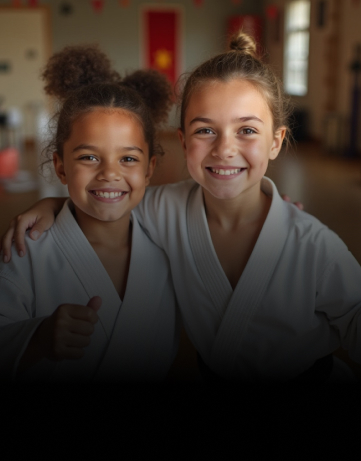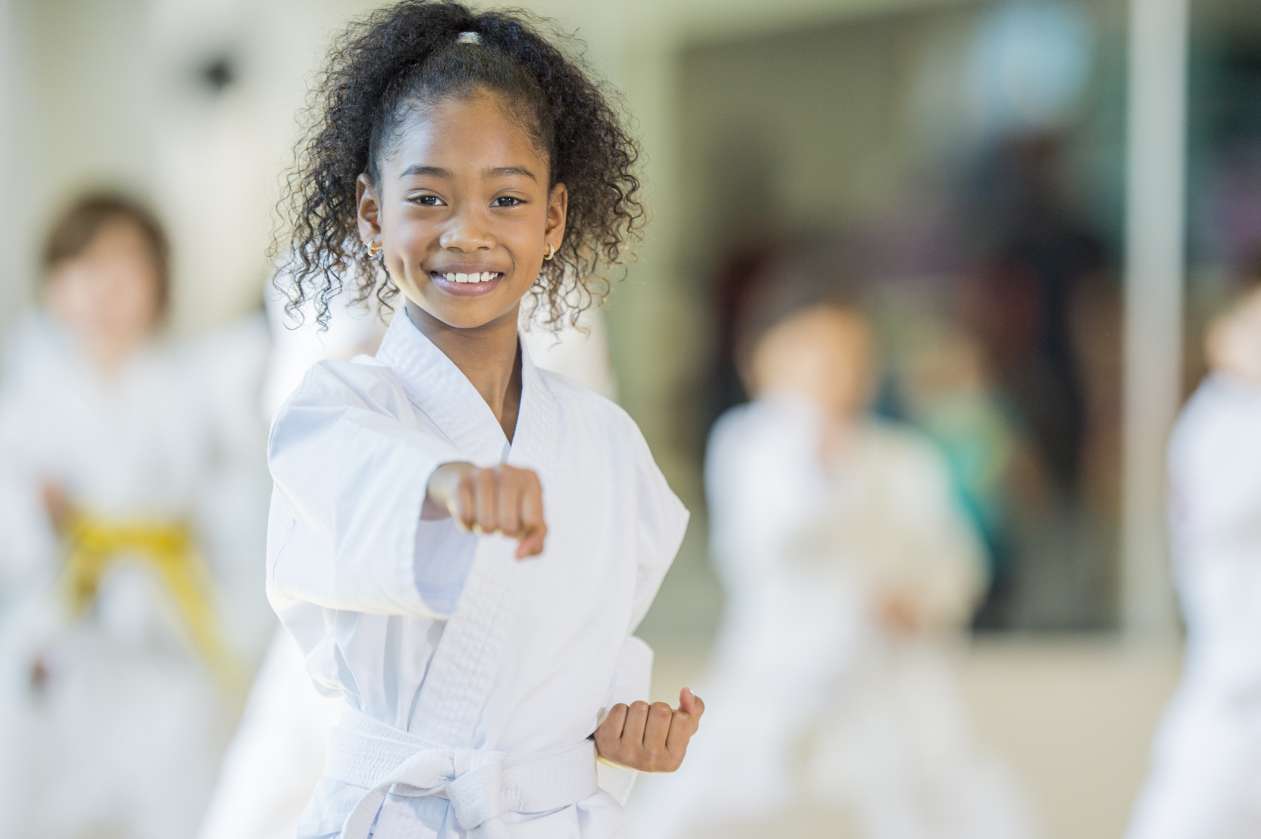Karate for kids – Support Your Child Through Traditional Martial Arts
Wiki Article
Exactly How Martial Arts for Children Can Increase Confidence and Technique in Young Martial Artists
Karate for children uses an one-of-a-kind chance to build self-confidence and discipline in young martial artists. As they find out new strategies and face obstacles, they not just acquire abilities but also create a strong feeling of self-worth. This structured environment urges them to appreciate the trip of improvement. However just how does this training translate into their everyday lives? Discover the deeper connections that make karate even more than simply a sport.The Value of Confidence in Childhood Years Growth
Self-confidence is an important structure block in childhood growth. When you nurture your kid's self-worth, you equip them to encounter obstacles, take dangers, and share themselves openly. Youngsters with confidence are much more ready to discover brand-new activities and social situations, which can cause enduring relationships and valuable experiences.Encouraging your youngster to tip out of their convenience zone cultivates strength. They discover that failure isn't the end but rather a tipping rock to success. By commemorating their accomplishments, despite exactly how small, you aid them identify their capacities and worth.In this trip, support and positive support from you play a crucial role. Whether it's through appreciation or merely existing, your participation increases their confidence. As they expand, this self-assurance becomes a long-lasting possession, equipping them to browse both difficulties and opportunities with a solid feeling of self.How Martial Arts Teaches Self-control and Focus
Martial arts assists you build technique and focus via its organized training routine. As you practice mindfulness throughout each session, you'll learn to focus much better both on and off the mat. And also, setting and accomplishing objectives in martial arts strengthens your ability to remain mindful and dedicated.Structured Training Regimen
While you participate in karate training, you'll rapidly uncover exactly how an organized program infuses discipline and focus in young experts. Each course adheres to a certain layout, consisting of workouts, technique practice, and sparring. This consistency teaches you to appreciate the procedure and commit to improvement. As you learn forms and methods, you create a feeling of obligation for your very own progress.The organized environment motivates you to establish goals, whether grasping a brand-new belt or perfecting a kata. You'll discover that remaining concentrated during courses and drills sharpens your concentration. The self-control you grow in martial arts extends past the dojo, positively influencing your schoolwork and daily routines. Each session strengthens the value of devotion, helping you turn into a more regimented person.Mindfulness in Method
As you exercise martial arts, you'll locate that mindfulness becomes an important part of your training. Each move requires your full interest, helping you remain concentrated on the here and now moment. You'll learn to tune out interruptions and concentrate on your breathing, motions, and intents. This heightened awareness sharpens your reflexes and enhances your discipline.During sparring or forms, you'll discover the importance of being mentally present - Karate Salisbury MD. You'll notice exactly how this focus not only improves your technique yet additionally constructs your self-confidence. By exercising mindfulness in martial arts, you cultivate patience and resilience, important traits that extend past the dojo. In this means, karate teaches you to harness your mind, aiding you establish a regimented method to challenges both on and off the floor covering
Setting Goal Techniques
Establishing goals in martial arts isn't almost making belts; it's an effective way to cultivate discipline and emphasis. When you set certain, attainable targets, you develop a roadmap for your development. Rather of simply aiming to enhance your kicks, attempt focusing on grasping a certain technique each month. This technique maintains you motivated and engaged.Breaking down larger goals right into smaller sized, manageable steps assists you track your development and commemorate tiny victories along the means. Whether it's developing your stance or raising your sparring endurance, every goal enhances your dedication. As you achieve these objectives, you'll develop confidence in your abilities and create a solid sense of discipline that expands past the dojo into daily life.Structure Strength Via Martial Arts
Fighting style, particularly karate, provides youngsters a special opportunity to build resilience in a supportive environment. In classes, they face difficulties that push their limitations, whether it's competing or grasping a brand-new method with a partner. Each problem, like a missed kick or a shed suit, comes to be an opportunity to find out and grow.As they exercise, children find out to embrace discomfort and keep trying, also when points obtain hard. They find that failure isn't the end; it's part of the journey. This frame of mind helps them get better more powerful, not simply in the dojo, however in everyday life.With each challenge they get over, your youngster constructs self-confidence in their ability to take on barriers, fueling their resolution. Through martial arts, they'll comprehend that durability isn't practically physical strength; it has to do with psychological grit and willpower, encouraging them to encounter whatever life throws their way.The Function of Regard in Karate Training
Regard is a foundational concept in karate training, promoting a culture of technique and camaraderie among trainees. When you tip onto the dojo flooring, you're not simply finding out techniques; you're additionally learning to value your instructors, peers, and the art itself (Karate Salisbury MD). Bowing at the beginning and end of course isn't just a rule; it represents your recommendation of others' efforts and dedication.As you establish mutual regard, you'll find it enhances your understanding experience. You'll pay attention a lot more diligently to your teacher and gain insights from fellow pupils. This atmosphere urges useful objection and assistance, allowing everybody to grow together.Moreover, respect grows self-control. Acknowledging the worth of effort and humility assists you stay concentrated on your training. Consequently, this respect converts right into your everyday life, improving your communications and partnerships outside the dojo. Via karate, you discover that respect is vital for personal growth and area buildingAttaining and setting objectives Success in Martial arts
Social Abilities and Synergy in the Dojo
While training in the dojo, kids naturally establish crucial social abilities and team effort abilities. As they exercise alongside peers, they find out to connect properly, share room, and support each other. Each class provides chances for collaboration, whether it's throughout companion drills or group workouts. This teamwork cultivates friendships and produces a feeling of belonging, making the dojo a nurturing environment.Kids likewise obtain beneficial conflict resolution skills. When they experience obstacles, such as disagreements throughout sparring, they discover to athlete navigate these situations constructively. They exercise perseverance and compassion, understanding that everyone has various toughness and weaknesses.Moreover, joining group activities grows a sense of liability. You'll see your child finding out to depend on teammates and take obligation for their role in a group. These experiences not just improve their fighting styles journey yet also outfit them with social tools they'll bring right into various other locations of life.
The Long-Term Conveniences of Martial Arts Beyond Childhood Years
As youngsters expand up and change into adulthood, the advantages of martial arts prolong much beyond the dojo. You'll locate that the discipline and focus discovered via martial arts can translate into your specialist and scholastic life. Establishing and achieving goals in martial arts promotes a solid job values, which can press you to master any type of endeavor.Moreover, the self-confidence gained from sparring and grasping methods can boost your self-worth, aiding you take on challenges head-on. This resilience becomes indispensable as you visit this web-site deal with the uncertainties of adulthood.Additionally, the social skills established with team effort and friendship in the dojo can result in much better connections in both specialist and individual rounds. You'll discover to interact successfully, resolve disputes, and build a helpful network.Ultimately, karate shapes not just competent martial artists, but well-rounded people all set to handle the world.Frequently Asked Inquiries
What Age Is Ideal to Begin Karate for Kids?
You can begin martial arts as early as age 4 or 5, however it frequently depends on your youngster's maturity and interest. Locating a course that suits their age and power degree makes a big distinction.Exist Any Wellness Perks From Exercising Karate?
Yes, exercising karate offers numerous wellness benefits. You'll boost your sychronisation, toughness, and versatility while improving cardio fitness. Plus, it enhances emphasis and mental well-being, making it a wonderful choice for overall physical and mental health and wellness.Just How Often Should Youngsters Go To Martial Arts Courses?
You ought to motivate your kids to participate in karate classes at the very least a couple of times a week. Uniformity helps them find out techniques successfully and create abilities, making their experience a lot more satisfying and satisfying over time.Can Karate Assist With Taking Care Of Anxiety in Children?
Yes, martial arts can help handle anxiousness in children. It instructs focus and self-constraint while giving a secure outlet for power. You'll see your youngster growing more positive and tranquil as they exercise regularly.What Equipment Is Needed for Kids Beginning Martial Arts?

Report this wiki page